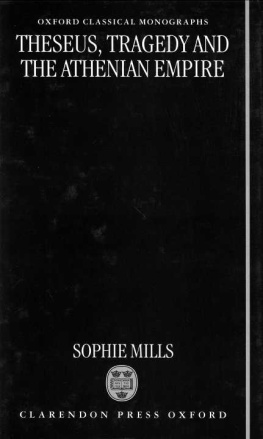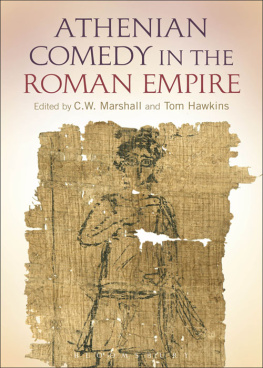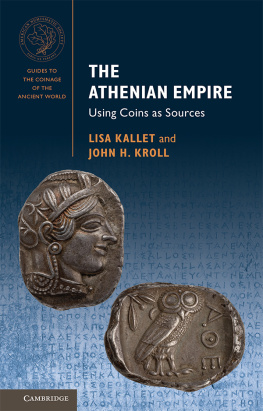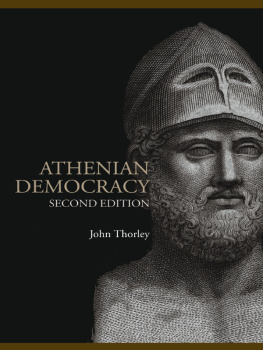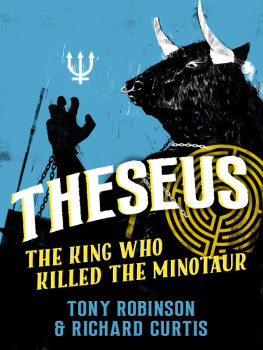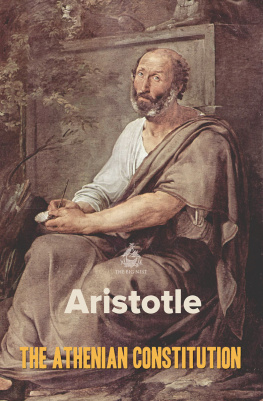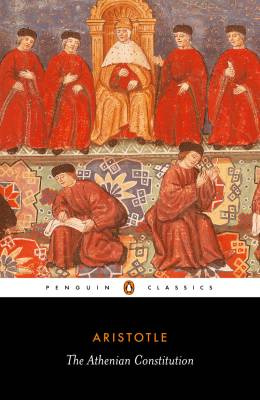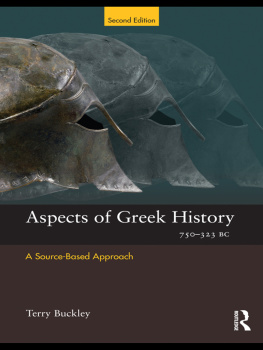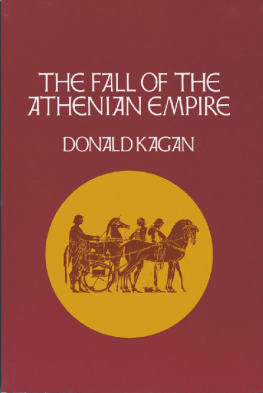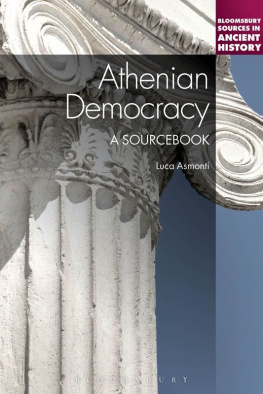OXFORD CLASSICAL MONOGRAPHS
Published under the supervision of a Committee of the F'acultY of Literae Humaniores in the (4dversitp of O ford
The aim of the Oxford Classical Monographs series is to publish books based on the best theses on Greek and Latin literature, ancient history, and ancient philosophy examined by the Faculty Board of Literae Humaniores.
Theseus, Tragedy and the
Athenian Empire
SOPHIE MILLS





ACKNOWLEDGEMENTS
My greatest thanks must go to Professor Sir Hugh Lloyd-Jones and to Dr Robert Parker for their invaluable instruction, help and encouragement in supervising the Oxford D.Phil. thesis which forms the basis of this hook; to my examiners, Dr Nicholas Richardson and Dr Richard Buxton, and to Dr Oliver 'I'aplin, whose shrewd and kindly advice helped me so much in the metamorphosis of a thesis into a hook. I must also express gratitude to the Fellows of Somerville College, who elected me to the Joanna Randall-1Maciver Junior Research Fellowship, enabling me to finish the thesis and embark on its transformation in thoroughly pleasant surroundings. Last, but not least, I must thank everyone who has had to live with this publication over the long years of its gestation; especially Mrs Kate 'Mills, Dr Michael Dewar, Dr Julia Griffin and Dr Naomi Stephan; also Gillian Carrington, Gillian Cloke, Victoria Elliott, Claire Martin and 'T'heresa Wise. Finally, thanks must go to Nayyir Bayyan, secretary of the Classics department, and Mike Honeycutt of the computer centre at UNC- Asheville, who assisted in producing the typescript.
I Would like to thank the following publishers for permission to reprint extracts from texts for which they hold the copyright. Oxford University Press for selected quotations from Oxford Classical Texts of Aeschylus, ed. D. L. Page (1972); Homer, vols. 1-3, ed. D. B. Monro and T. W. Allen (first published 1902, 1908); Euripides, vols. i and 2, ed. J. Diggle (1981, 1984) and VOL 3, ed. G. 'Murray (first published 1909); Fragmenta Hesiodea, ed. R. Merkelbach, M. L. Nest (1967); Sophocles, ed. H. LloydJones, V. G. Wilson (1990); Thucydides, ed. H. S. Jones (first published 1900); Virgil, ed. R. Alynors (1969); also Poetarum Melicorum Graecorum Fragmenta, ed. 1I. Davies (1991) and Iambi et Elegi Graeci ante Alexandrum Cantati, ed. M. L. West (1989); Clarendon Press editions of Euripides' Hippolytus, ed. W. S. Barrett (1964) and Euripides' Heracles, ed. G. W. Bond (1981); Euripides, by C. Collard (1989); and Inventing the Barbarian, by E. M. Hall (1989); all by permission of Oxford University Press. Oxford University Press (New York) for selected quotations from Theseus and Athens, by H. J. Walker (Oxford, 1995). Georg Olms Verlag for use of H. Diels and W. Kranz, Fragmente der Vorsokratiker, 11th edn. (Zurich and Berlin, 1964), ii, 285-6. The Egypt Exploration Society for the texts of Oxyrhynchus Papyri 1241, 2078 and 3531. B. G. Teubner for Pindar, Carmina cum Fraginentis, ed. B. Snell (Leipzig, 1970) and Bacchylides, Carmina cum Fragmentis, ed. B. Snell (Leipzig, 1971), and for selected quotation of the fragments of Euripides from Tragicorum Graecorum Fragmenta, ed. A. Nauck and B. Snell, 2nd edn. (1964). Vandenhoeck and Ruprecht for quotation of texts from volumes 1, 3 and 4 of Tragicorum Graecorum Fragmenta, ed. B. Snell, R. Kannicht and S. Radt (Gottingen, 1971-85). Harvard University Press for permission to quote from the following Loeb editions: Lysias: Orations, trans. W. M. R. Lamb (1940); Isocrates: Orations, vols. 1, 2 and 3, trans. G. Norlin (1928-45); Pausanias, Description of Greece, vol. 2, trans. W. H. S. Jones and H. A. Ormerod (1960); Plutarch, Lives, vol. i, trans. B. Perrin (1967); Plato, Works, vol. 12, trans. W. M. R. Lamb (1955): also quotations from The Invention of Athens, by Nicole Loraux, copyright 1986 by the President and Fellows of Harvard College, reprinted by permission of Harvard University Press.
I should like to dedicate this hook to Somerville College, and especially to Nan Dunbar and Miriam Griffin, in gratitude for everything.
S. AI.
University of North Carolina at Asheville
1996
CONTENTS
ix
6. Theseus of Trozen: Euripides' Hippolytus and its
ABBREVIATIONS
I have been unable to take anything more than selective notice of publications that reached me after 1993, and take this opportunity to apologize for any glaring omissions. All translations of Greek are my own; they are designed for the Greekless reader and have no pretensions beyond this function. All abbreviations follow the conventions laid down in the Annee Philologique, and the following may also be noted:

I
Images of Theseus before Tragedy
I.I INTRODUCTION
The function of this past is essentially aetiological because it purports to explain what has made the society what it is: it defines the nature of the society for its members, and the past is used as a guide to the future to encourage certain values and types of conduct. In the Greek world especially, what past generations were has a direct bearing on current ones, and particularly outstanding individuals or groups, whether from recent history or the heroic past, can be made to stand as allegedly typical examples of the prowess of the city as a whole, exemplifying behaviour which should be `natural' for all its members. It need hardly be said that this socalled `national character' prescribes behaviour at least as much as it describes it, and that it is not necessarily fixed or free from contradictions, in spite of the way that it is usually presented, as something natural, time-honoured and self-evidently right.
and whose function, like that of myth itself, was partly educational. This book seeks to trace the process by which the figure of Theseus in the public genre of tragedy is moulded according to certain public, 'official' Athenian perceptions of the Athenian national character, so that he comes to represent the idealized imperial Athens, the city of justice and mercy that is familiar from a substantial body of Athenian writing about Athens. First, however, it is necessary to trace the earlier development of his role in Athens, and the process by which an individual hero, who originally represented nothing but himself, conies to represent collective Athenian virtue. Theseus' role in the story of the Minotaur and certain other tales is not as complex as his role in tragedy, but the mighty killer of monsters is a direct ancestor of Theseus the humane, democratic king of tragedy who stands against all forms of tyranny.
I .2 THESEUS BEFORE TRAGEDY: HEROES AND MORALITY
However, once his reputation becomes part of Athens' reputation after a consistent link has been forged between them, it is important that his deeds are suitable reflections of attributes deemed to he Athenian and models for Athens. In some of his earliest appearances in eighth- and seventh-century literature and art, he is distinctly ambiguous as a symbol of Athenian prowess: although he was one of the fighters against the uncivilized Centaurs with his Thessalian friend Peirithous, he also assisted him in a disastrous attempt to abduct the queen of the underworld, and he himself carried out a scarcely less disastrous abduction of Helen. Even his most magnificent exploit of killing the Minotaur in Crete, so that Athens was liberated from king Minos' oppression, was followed by an act of ingratitude and treachery to the king's daughter Ariadne, whose help to him in killing the monster was rewarded by abandonment by Theseus as he made his way back to Athens.

